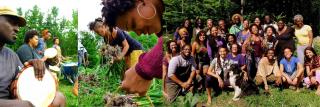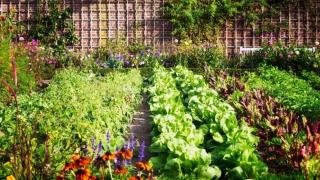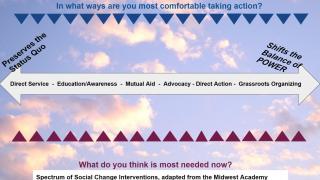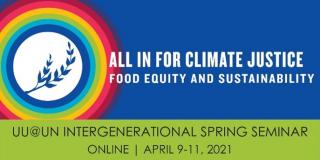All In for Complexity
By Allison Hess
Everything is interconnected. For many of us in the U.S. and Canada, our societies’ systems rely on – and have serious ramifications for – the planet we call home. Take food for example.
Food production and distribution has enormous impacts on both local environments and global climate. Communities experience food apartheid, cutting some neighborhoods off from access to healthy, nutritious, affordable foods. All over the world, farmworkers and farmland are exploited in pursuit of profit. Extreme racial divides separate who owns the land and who works the land. The industrialized food system is both unjust and unsustainable. All these and more make up the complexities that surround the topic of this year’s Intergenerational Spring Seminar, hosted by the Unitarian Universalist Association Office at the United Nations (UU@UN), in partnership with the Unitarian Universalist Ministry for Earth (UUMFE).
The 2021 Intergenerational Seminar addressed the theme “All In for Climate Justice: Food Equity and Sustainability.” The event was planned with a focus on justice, equity, and interdependence. Acknowledging that seeking justice in our food systems is tied together with climate justice, racial justice, and so much more, this Seminar sought to center the experiences of those most affected, honor the need for collective action to change larger systems, and give people the tools to be part of the struggle for food justice.
Grounding
The Seminar began by grounding participants in an understanding of how they fit into food systems. In small groups, attendees reflected on the most recent meal they ate: where the ingredients came from, whose labor and resources made it possible for them to eat it, and what this meal meant to them.

Images from Soul Fire Farm. More about 2021 Seminar Keynote Address.
The “grounding” phase continued with the keynote presentation by Leah Penniman from Soul Fire Farm. Penniman is the author of the book Farming While Black, and the farm is described as “an Afro-Indigenous centered community farm committed to uprooting racism and seeding sovereignty in the food system.” The keynote helped participants collectively understand some of the history and current realities of injustice in our food systems. A resource shared on Soul Fire Farm’s website explains powerfully and succinctly:
“Racism and injustice are built into the DNA of the U.S. food system. Beginning with the genocidal land theft from indigenous people, continuing with the kidnapping of Black people from the shores of West Africa for forced agricultural labor, morphing into convict leasing, expanding to the migrant guestworker program, and maturing into its current state where farm management is among the whitest professions, farm labor is predominantly brown and exploited, and people of color disproportionately live in “food apartheid” neighborhoods and suffer from diet-related illnesses – the system is built on stolen land and stolen labor. It is working as designed.” – Soul Fire Farm
More than 98% of privately-owned farmland in the United States is white-owned. Consider what that statistic means for intergenerational wealth and food security. While we were not able to find statistics illustrating these issues in Canada, we know that similar trends exist there both historically and currently.
Connecting
The second phase of the Seminar focused on “connecting” people to one another and to existing organizations and movements that work for climate and food justice. Participants reflected on how food injustice harms communities – and where food justice is healing communities. The keynote introduced the concept of “food apartheid” as a more useful way of thinking about the root causes of poverty and hunger in what are sometimes called food deserts. Food apartheid exists in communities that have disinvested in the neighborhoods where Black and brown people live.
I live in Rochester, NY, home to the famous Wegmans chain of grocery stores. In March 2021, on the one-year anniversary of the murder of Daniel Prude by the Rochester Police Department, Black Lives Matter activists protested outside the one remaining Wegmans located inside city limits. “Wegmans started in the inner-city, in some of our most vulnerable communities,” according to Justin Morris, president of the Rochester chapter of the grassroots social change organization Arc of Justice. When the business took off, they shut down their smaller city stores and expanded in the suburbs. In a city that’s 40% Black and 37% white, the remaining store on East Avenue is only easily accessible to the wealthy, mostly white residents in the surrounding neighborhood. Thanks to a history of redlining, high-quality grocery stores are not present in other parts of town where more Black residents live.
A recent forum recommended revising Rochester’s zoning codes with specific guidance on agriculture, gardening, and composting, as well as “ensuring long-term access to land so that people can invest in urban farms.”

Rethinking how land is used is an essential way to address climate and food justice. A panel discussion featured during the Spring Seminar addressed ways to “Ensure food security in a world of changing climate.” Panelists emphasized the importance of expanding forested land to mitigate climate change. In so many places, forests are burned down to make way for cattle and other livestock to graze. This practice is enormously harmful for the planet both a) because it destroys the lush carbon-capturing forests and their essential biodiversity and b) because cows emit methane, a harmful greenhouse gas. Small-scale, biodynamic, sustainable farming is highly preferable to the prevalent industrial monocropping approaches that are depleting soil and biodiversity around the world.
Additionally, the panelists spoke about the impact plant-based diets can have toward global efforts to mitigate climate change. Because of the carbon emissions caused by animal agriculture, it is clear that transitioning to more plant-based diets is essential in the fight against climate change. And, we must recognize the complexity.
Not everyone can or should adopt an entirely plant-based diet. Many cultures around the world, notably indigenous communities, do have ways of sustainably raising livestock for food and should not be forced to give up those cultural traditions and heritages. Rather, the rest of the world should learn from them. Individuals may have dietary restrictions, sensitivities, or eating disorders that would make a plant-based diet inadvisable for maintaining their health. Lack of access to nutritious plant-based options is yet another barrier faced by many.
And, for those who can, decreasing regular consumption of meat, dairy, and other animal products is one essential move towards ensuring a sustainable future for the planet.
The world must collaboratively revise food systems, listening to wisdom from indigenous traditions about how to grow food sustainably and create grassroots-led structures that allow everyone equitable access to those foods. The upcoming UN Food Systems Summit would have been an opportunity to begin doing just that; however it has been taken over by corporate interests, forcing indigenous communities, peasant movements, and small-scale farmers to host a counter-summit that focuses attention where it’s actually needed: on agroecology, human rights, and food sovereignty.
Equipping
The final phase of the Seminar was aimed at “equipping” attendees to get involved in change-making. During the Sunday workshop “From Passion to Action: Effective Community Engagement,” presenters shared about some sustainable food systems they are part of. Aly Tharp introduced participants to the Festival Beach food forest that nourishes the surrounding community in Austin, TX; Dr. Karambu Ringera shared about her organization’s work to revitalize both the land and the community through the Tiriji Eco Center in Kenya; and Joey Kyle presented his work on the Many Hands Peace Farm and mushroom gathering in the forests surrounding The Mountain Learning and Retreat Center, a UU camp in North Carolina.
A final workshop gave participants the opportunity to put some of what they learned into action. The workshop “Rooted in Action: Reaching Toward Justice” invited each attendee to consider their own involvement in the movement for climate and food justice. In order to make social change, movements must address all three aspects of the social movement ecosystem presented by Amelia Diehl from UU Young Adults for Climate Justice: personal transformation to individuals’ behavior, community alternatives to address the issues directly, as well as collective work to change dominant institutions.
As each of us considers how to be involved, it is important to focus both individual and collective energy toward the types of action that will be most impactful. Direct service and education or awareness work are valuable, but they tend to preserve the status quo. Actions like grassroots organizing and direct action, meanwhile, are better aimed at shifting the balance of power. All types of action are important and we must be intentional about our involvement. If we know the balance of power needs to shift, our attention cannot be entirely focused on education/awareness, or else we will never achieve our goals.

A slide shared during the workshop to demonstrate the spectrum of social change interventions
The final workshop included time for attendees to begin taking action by writing to their representatives about current legislative issues having to do with food justice, such as supporting the Justice for Black Farmers Act and the Climate Stewardship Act in the U.S., and addressing food security in Black communities, environmental racism, and First Nations fishing rights in Canada. The Seminar concluded with a closing ceremony full of song, sharing, and community opportunities to stay involved.
All In
It may feel daunting to grapple with the complex interconnectedness weaving through our lives and the systems we rely upon. It’s true that justice calls us to act, to work toward a better future, when it would be easier to ignore such complicated problems. But instead take this moment as a chance for personal, collective, beautiful transformation. Really imagine how much better our food system could be. Imagine having access to local, sustainable, culturally appropriate food; imagine knowing who grew it, knowing they compensate their workers fairly, and knowing their practices give back to the land and the community; and imagine experiencing relief once everyone can say the same for their food. If we are truly All In for Climate Justice, we can make it a reality.

Read more about the 2021 Intergenerational Seminar, including recordings of some of the sessions and resources for further engagement with the theme “All In for Climate Justice: Food Equity and Sustainability.” The UU@UN is now accepting applications for youth (age 14-18) and adult volunteers to serve on the 2022 Planning Committee!